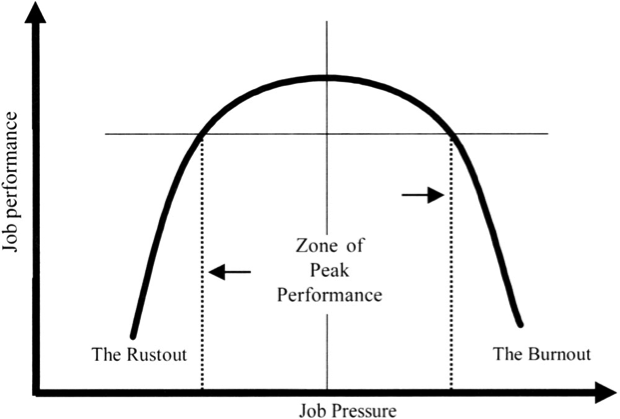In order to be as resourceful as possible and operate within your zone of peak performance it’s important that you get the balance right between too much and too little pressure. Your role requires you to deal with several things at once, maintain the overview and delve into the detail when required. You need full access to your brain to embrace challenging moments, make decisions, resolve issues, delegate and motivate.
Taking on too much work pressure can be a major hindrance for being resourceful and for performing at your best. When you let external events stress you, it’s your “emotional brain” that takes over and that makes you feel unsettled, constrained and tense. This also means that you are not making full use of the frontal part of your brain where your reason and logic resides. Fortunately you can keep negative stress at bay by understanding how it comes about.
Negative stress is a feeling of not being in control. It is something you experience when the demand for your time and services exceeds what you feel you have to offer – or when there is a significant difference between what you expect and what actually happens. A key point in relation to stress management is your subjective feelings and perceptions. What is stressful to one may not be stressful to another.
Many people believe that stress is a direct result of external events and stressors, such as a demanding stakeholder or boss. But emotional stress doesn’t stem directly from external events. It stems from the beliefs you hold about them. The meaning you choose to attach to an event is the meaning it takes on. When you interpret an event as being negative or bad, you get into a negative or stressful state and vice versa. Therefore, it’s not the events themselves that determine how you feel, but the meaning you attach to them. It is with stress as with so many other factors of life; you need to look inwards before you look outwards.
There are numerous types of situations on a project that could cause you excessive stress if you don’t pay attention and actively work on your beliefs. This could be anything from being asked to plan a new large project, having to quickly make major decisions, presenting the to steering committee, managing a growing inbox, dealing with unexpected issues, facing off to senior executives, dealing with challenging team members and having to justify project estimates and timescales. The list goes on.
Whereas you may not be able to control an unreasonable stakeholder or boss, you are able to control how you respond. The key is to pause when you begin to feel stressed, and to count to ten in order to prevent your emotional brain from taking over and generating and automatic reaction. As you pause, look at the situation from several angles and ask yourself which meaning you attach to the event that you find stressful. At that time, also remind yourself that you can only really grow and develop when you're being stretched and tested. When you’re under pressure you get the opportunity to show your real strengths and to come up with creative solutions. Many people perform really well at the edge of their comfort zone.
Finding the right balance between negative and positive stress is also relevant with respect to the teams you manage. If you don’t put sufficient demands on your team members, you are unlikely to lead them to high performance. If on the other hand you put too much pressure on them without providing the necessary support, they will begin to feel overly stressed and will under-perform. The best way to find out how they feel isn’t just to observe them, but to ask them. As a project leader it’s your responsibility to monitor your team’s stress levels as much as your own.
Have a look at the next post in the series where I provide the Ten Timeless Techniques to Combat Negative Stress.
If you liked this post, you may also like:
My Story - Working Smarter; Not Harder
Delegate Effectively and Thoughtfully
Seven Essential Time Management Strategies
10 Tips for Handling Conflict









 RSS Feed
RSS Feed